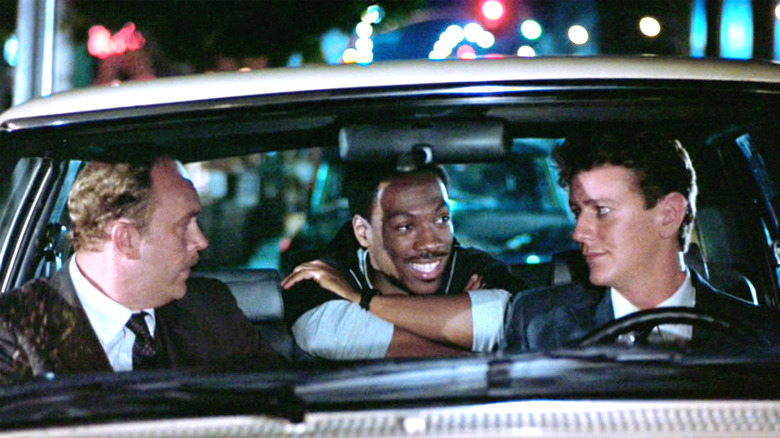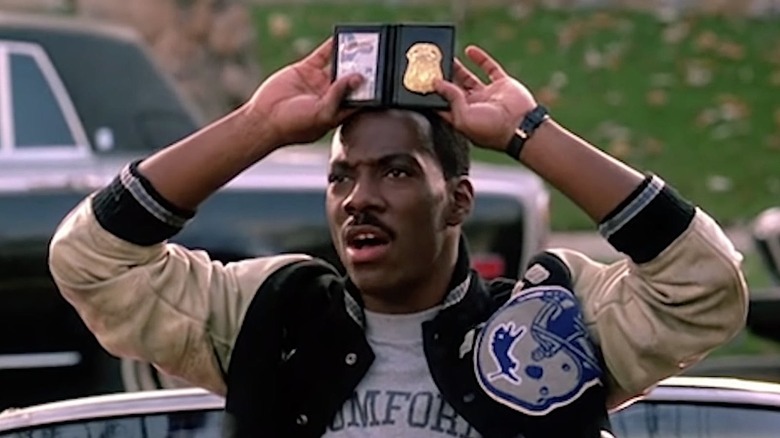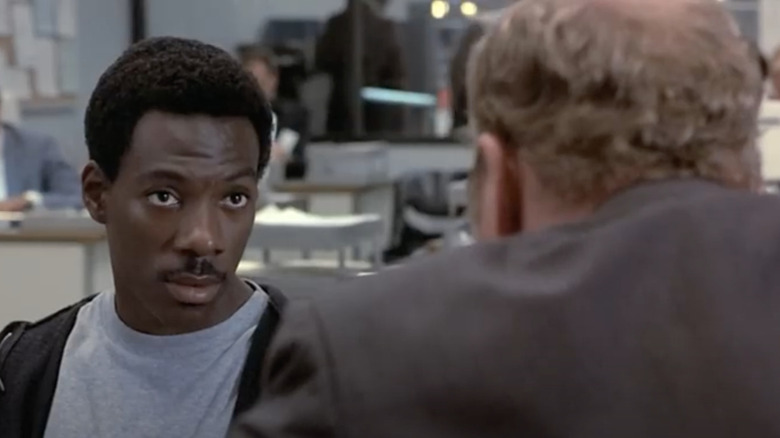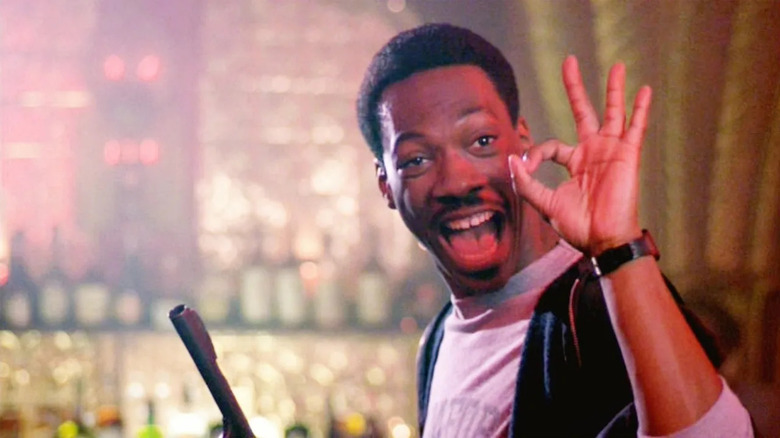Beverly Hills Cop Was Michael Eisner's Response To A Speeding Ticket
1984's "Beverly Hills Cop" contains a plot hook so good it seems like a no-brainer idea in hindsight: a streetwise Detroit policeman finds himself in a fish-out-of-water situation when he pursues a criminal to luxurious Beverly Hills, whereupon his blue-collar attitude clashes with the snooty, affluent natives.
Yet a study of the making of the film reveals that it had a fairly rocky transition from concept to screen, with the production going through several different directors, stars, and tonal approaches before landing on director Martin Brest and star Eddie Murphy. That could be due in part to the fact that the core concept for the movie wasn't so fleshed out upon conception.
Way before a series of screenwriters began work on what would eventually become "Beverly Hills Cop," then Paramount executive Michael Eisner had the simple notion to make a movie about a Los Angeles policeman, an idea that occurred to him thanks to having some particularly bad luck on the road one day.
Michael Eisner meets a real-life Beverly Hills cop
Back in 1975, Eisner was the president of Paramount Pictures (or at least, was about to be — his official website states that he didn't assume the presidency until 1976). According to a December 1984 article in the New York Times, was speeding one day on an L.A. freeway when he was pulled over by a cop. According to Eisner, the cop who pulled him over was "extremely efficient, reasonably rude, with an air of superiority and quiet condescension."
While getting a speeding ticket isn't a remarkable event for most people, Eisner's movie-producer brain was clearly in overdrive when mulling over the incident, moving past the bare facts and reading into the subtext of what just happened. Eisner thought that his being singled out for speeding had more meaning than whatever number his speedometer had read — he believed that his well-worn station wagon that he used to drive in New York City stood out amongst the flashier L.A. traffic.
After buying a Mercedes the day after the encounter, Eisner claims he "went to the office and said we have to do a movie about a Hollywood cop." Thus, "Beverly Hills Cop" was born. Or was it?
The growing pains of Beverly Hills Cop
While Eisner's story was immortalized in that article, co-producer Don Simpson believed he was the one who came up with the idea for "Beverly Hills Cop," not Eisner. Whatever the case may have been, it's clear that the concept was barely bigger than "a cop working in Beverly Hills."
That's why, when writer Danilo Bach was brought in by Simpson to flesh the idea out into a feature-length script, it took several years for a first draft to be completed. That initial draft was allegedly entitled "Beverly Drive," and it had the bare bones of what "Beverly Hills Cop" became: a cop from a tough city (Pittsburgh, in this case) named Elly Axel travels to Beverly Hills to investigate a friend's death. Yet that early draft was a full-on action script, as opposed to an action-comedy like the final film. Hence, Paramount, Simpson, and his producing partner Jerry Bruckheimer were entertaining the likes of Mickey Rourke and Sylvester Stallone for the lead role.
When screenwriter Daniel Petrie Jr. was given the assignment to rewrite the film after executives at Paramount read his script for what eventually became "The Big Easy," the writer conceived a different tonal approach for the movie. In a 2013 interview, Petrie explained how living as an aspiring screenwriter while working in a Beverly Hills office allowed him to "see something funny" every day. When given the "Beverly Hills Cop" assignment, Petrie said that "it immediately occurred to me that it should be comedic. In the three previous scripts there was some humor but they were more straight-ahead police thrillers. [...] Paramount was surprised when they got my script and it was much more comedic. They found it funny, and were surprised and pleased."
Beverly Hills Cop finally finds its title character
Back when "Beverly Hills Cop" was to potentially star Stallone, the actor did his own rewrite of the script, ending up with two drafts which Simpson claimed were two of the best scripts he ever read. When Paramount told Stallone that they were much more interested in making the more comedic version that Petrie Jr. had penned, Stallone left the project, and Simpson and Bruckheimer turned to an actor who'd shown interest in the project but hadn't yet been approached: Eddie Murphy.
With Murphy and Brest on board, "Beverly Hills Cop" became the story of Axel Foley, a Detroit cop who travels to Beverly Hills to find out who killed an old buddy of his. The film went on to gross $316 million over a $13 million budget, becoming one of the biggest hits of 1984 and spawning two sequels over the next ten years. As the brand new "Beverly Hills Cop 4" gets ready to hit Netflix sometime soon, it's wild to think that all this drama may never have happened had Michael Eisner simply gone the speed limit.



